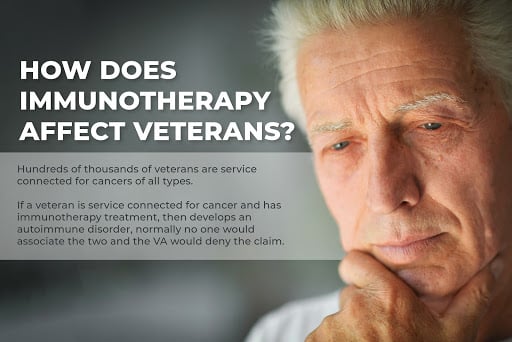A Cure with a Kick: Secondary Autoimmune Disorders to New Cancer Therapy
Immunotherapy is a relatively new treatment for cancers such as Hodgkin’s lymphoma, small cell lung cancer, and other hard to treat cancers and has some wonderful results. The basic theory is that immunotherapy prompts the body’s own immune system to attack cancer cells. However, some people are developing new autoimmune disorders due to immunotherapy treatment.
About 1% of people treated with immunotherapy developed a rare, adult-onset of Type 1 diabetes. Unfortunately, the condition is often misdiagnosed as Type II and attributed to other issues in many adults. Currently, most people who have a comorbid autoimmune disorder and cancer are not eligible for immunotherapy treatment because of the fear that it will worsen their autoimmune disorder; however, the benefits may outweigh the risks.

What Is Immunotherapy?
It’s important to understand the function of immunotherapy before diving into the potential side effects. As mentioned above, this cancer treatment works by boosting the body’s immune system. The immune system can then attack the cancer cells. There are several types of immunotherapy, including:
- Checkpoint inhibitors: During this type of immunotherapy, drugs are administered to help the immune system recognize the cancer cells. The immune system can then attack the cancer cells.
- Chimeric antigen receptor (CAR) T-cell therapy: This therapy involves t-cells taken directly from the cancer patient’s blood. The medical professional then mixes these existing cells with a virus that causes the t-cells to attack the cancer cells. They then inject the car-t therapy mixture into the patient.
- Cancer vaccines: Some types of immunotherapy are administered as a vaccine.
- Monoclonal antibodies: Also called mAbs or MoAbs, these antibodies are synthetic versions of immune proteins. The proteins are designed to specifically attack cancer cells.
Other types of immunotherapy include cytokines, immunomodulators, and oncolytic viruses. All of these treatment options are designed to either boost the body’s natural immunity or simulate the immune system. The FDA has approved immunotherapy as a treatment for a number of cancer types, including bladder cancer, breast cancer, and prostate cancer. Immunotherapy drugs may be an effective alternative to traditional treatments like chemotherapy and radiation therapy.
Immunotherapy Side Effects
While immunotherapy treatments attack cancer cells, they may also harm healthy cells. This can cause a number of side effects. The most common side effects of immunotherapy include flu-like symptoms and skin reactions. Treatment can cause cancer patients to experience fever, fatigue, chills, muscle weakness, vomiting, nausea, body aches. Along with these flu-like symptoms, they may also have high or low blood pressure. Skin reactions may include dryness, redness, blisters, and sensitivity to sunlight. Other side effects may include:
- Headaches
- Weight gain (fluid retention)
- Leg swelling
- Sinus congestion
- Shortness of breath
- Cough
- Hormone changes (such as hypothyroidism)
It’s important that cancer patients keep their oncologist updated about any immunotherapy side effects. A cancer care team can help with immunotherapy side effects management.
Immunotherapy And Autoimmune Diseases
Recent clinical trials are studying the safety of cancer immunotherapy treatment in individuals with autoimmune diseases. Autoimmune diseases are conditions in which the body’s immune system attacks healthy cells. These are diseases like type 1 diabetes, celiac disease, multiple sclerosis, and rheumatoid arthritis. Oncologists have had concerns about this type of cancer care for patients with autoimmune diseases, as people with these conditions already have overactive immune systems.
If a cancer patient doesn’t have an autoimmune disease, the development of such diseases can be among the serious side effects of treatment. Veterans who may have developed an autoimmune disease from immunotherapy cancer treatment may be eligible for benefits based on their condition.
How Does Immunotherapy Affect Veterans?
Hundreds of thousands of veterans are service-connected for cancers of all types. If a veteran is service-connected for cancer and has immunotherapy treatment, then develops an autoimmune disorder, normally no one would associate the two and the VA would deny the claim, if there was a claim even filed. Most autoimmune disorders are not service-connectable unless they developed in service or within one year of discharge (7 years in the case of Multiple Sclerosis). However, this changes the ball game. These claims would now be secondary disorders to the current service-connected cancer.
How to File a Claim for Autoimmune Disorders after Cancer Treatment
If a veteran has gone through immunotherapy treatment and later developed an autoimmune disorder, there are certain documents that are required to file a claim.
1. Documentation of immunotherapy treatment from an oncologist or healthcare provide=, preferably including the specific medications used in treatment;
2. How often the veteran was treated with immunotherapy treatment (schedule of treatment);
3. What type of cancer was being treated (it must be service-connected cancer); and
4. Diagnosis of an autoimmune disorder that developed after treatment.
What Autoimmune Disorders are Connected to Immunotherapy side effects?
Even if the cancer is in remission, if a veteran acquires Type 1 diabetes or systemic sclerosis from immunotherapy treatment, that could lead to an increased rating based on the severity of the disorder. Some potential autoimmune disorders linked to immunotherapy include:
1. Type 1 diabetes;
2. Dermatomyositis;
3. Systemic sclerosis;
4. Rheumatoid arthritis;
5. Sjogren’s syndrome;
6. Lupus;
7. Multiple Sclerosis;
8. Pneumonitis (inflamed lungs);
9. Colitis; and
10. Uveitis (inflamed eyes).
Some of these are symptoms to an autoimmune system gone awry and can be treated and others are permanent conditions. Regardless, if a veteran who has undergone immunotherapy treatment is diagnosed with any autoimmune disorder, filing a claim for secondary service connection is warranted.

To see if you may be eligible for a claim, please call today for your free consultation.




